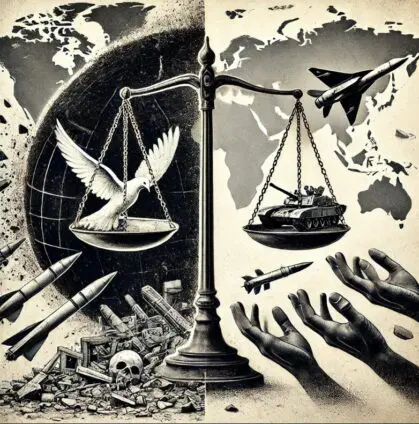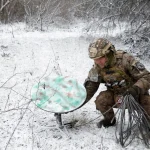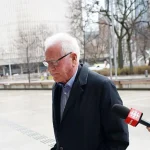A tragic event unfolded at the Nova Music Festival on October 7, 2023, near the Gaza Strip, a coastal region bordering Israel and the Palestinian territories. Armed men identifying themselves as Hamas militants took hostages from the Jewish and international crowd, resulting in a significant loss of life, with around 1,200 fatalities reported.
The Palestinian Islamist group Hamas seeks an end to Israeli control over the West Bank, a territory widely acknowledged as part of the Palestinian territories. However, the United States and Europe, have classified Hamas as a terrorist organization, condemning their actions, including the October 7 incident, as terrorist attacks on Israel’s sovereignty.
Israel, already in breach of Palestinian territorial sovereignty due to its illegal occupation of its lands, responded to Hamas terrorism with its own form of terror.
According to Israel, since Hamas operates among the Palestinians in Gaza, its first act to bring the terrorists to justice was to impose what it describes as a total siege on the entire Gaza community, which comprises approximately two million people – roughly 20% of Israel’s population.
The siege involved cutting off energy, water, food supplies, transportation, and closing schools, thereby paralysing community life. The entire population was unable to access the outside world, and conversely, the outside world was not permitted to enter. This inevitably led to severe humanitarian crises and healthcare emergencies.
Amidst these events, Israeli tanks rolled into Gaza, demolishing entire communities and rendering them flat plains. Concurrently, Israeli warplanes, equipped with bombs supplied by the United States and Europe, began dropping devastating explosives on civilian populations. In some instances, entire generations of families were eradicated. Others who sought refuge in hospitals to treat their injuries after being bombed were pursued and assaulted in these supposed safe havens.
The most heinous of these campaigns has been the deployment of assassination squads, whose primary objective has been to target media personnel, humanitarian agencies, and paramedics. The ensuing outcry from this carnage prompted the Israeli government to enact emergency laws, restricting foreign media access and thereby limiting reports of the atrocities committed against civilians under the pretext of combating Hamas.
According to Aljazeera Israeli attacks have killed more than 11,000 students in the Gaza Strip and occupied West Bank since October 7, 2023. Citing the Palestinian Ministry of Education it says at least 41,252 people have been killed and 95,497 wounded in Israel’s war on Gaza. The United Nations Prosecutor has labelled Israel’s actions in Gaza as genocide and is seeking arrest warrants for the Israeli President and Minister of Defence.
Amidst the chaos, Hezbollah, a liberation group based in Lebanon – a sovereign nation sharing a border with Israel to the north – called for a ceasefire in Gaza. This militant group, designated by Israel and its Western allies as terrorists, began firing rockets into Israel from its northern border, stating they would continue until their ceasefire demands in Gaza were met. This is not Hezbollah’s first conflict with Israel; previously, they fought a war spanning over three decades, ultimately driving Israel out of Lebanese territory it had occupied in the north.
Israel has claimed that the recent missile attacks from Hezbollah displaced approximately 60,000 of its citizens in the North. In an effort to return those people to their homes in the North, Israel disregarded ceasefire calls and expanded its military operation to Lebanon, effectively invading the country. Israel asserted that its target was not ordinary Lebanese citizens, but Hezbollah.
Once again, using bombs supplied by the United States and Europe, Israel replicated its Gaza strategy in Lebanon, albeit with heightened ferocity and cruelty. Pagers and walkie-talkies used by civilians and Hezbollah militants were clandestinely fitted with explosives. Without warning, the Israelis remotely detonated these devices while handlers were amidst densely populated communities.
Reporting for BBC News in September 2024, Matt Murphy stated that at least 32 people, including two children, were killed and thousands more injured, many seriously, after communication devices, some used by the armed group Hezbollah, explosively detonated across Lebanon. In the latest round of blasts, exploding walkie-talkies killed 20 and injured at least 450 people, according to Lebanon’s Health Ministry. The explosions occurred near a large crowd gathered for the funerals of four victims of Tuesday’s simultaneous pager blasts, which killed at least 12 people and injured nearly 3,000.
Lebanon’s Health Ministry has reported that over 2,000 people have been killed by Israeli strikes on Lebanon since last October. These explosions effectively cleared the airspace for Israeli war jets to drop bombs on civilians and paved the ground for Israeli troops to engage in combat.
Notably, the attack on Gaza continues after a year. The question remains: who committed crimes against Israel in Gaza and its northern border, and who is paying the price? The answer is straightforward: Hamas and Hezbollah have acknowledged their roles in the October 7 attacks and the firing of rockets into Israel from its northern border, respectively. Yet, it is thousands of ordinary civilians who are bearing the brunt.
Israel continues to justify its state-sponsored terrorism against innocent civilians, citing the seamless integration of Hamas terrorists and their Lebanese counterparts, Hezbollah, into the civilian population. This alleged difficulty in isolating them is used to justify targeting areas where they are believed to be hiding. The Israeli argument suggests that innocent lives lost in pursuit of criminals should be viewed as a necessary evil. However, this principle contradicts the criminal justice code, which protects the rights of the accused, presuming innocence until proven guilty beyond reasonable doubt in a competent court.
This raises questions about the laws and standards applied to innocent children, women, and men killed or raped by the Israeli army, particularly given Israel’s reputation for civilized government and moral standards. If the criminal justice system prioritizes the protection of the accused, why are the innocent civilians bearing the brunt of these actions in Gaza and Lebanon?
It has perhaps become a mockery of international laws and civilization to acknowledge that Israel does not act alone, but is supported by America, France, Britain, and Europe, who supply the weapons and resources enabling Israel to harm civilian populations.
Holding Israel and the Western world accountable for these actions does not justify terrorism, regardless of whether it is perpetrated by individuals or sophisticated organisations like Hamas and Hezbollah. However, Israel’s justification of its actions based on terrorist behaviour is unacceptable. It is unconscionable for Israeli soldiers to commit rape against civilians in detention simply because Hamas does the same.
Similarly, Israel’s use of explosives in civilian devices, detonating them in public spaces, killing hundreds, and maiming thousands, is an egregious betrayal. This surpasses the harm caused by suicide bombers, who act alone, consent to their actions, and target specific locations to make a political statement. It is astounding that a regular army, with a UN seat and foreign embassies, engages in such criminality.
How do these acts differ from those we label as terrorism?
It must be clear. Identifying criminals has never been easy, especially when the crime is terrorism. The difficulty in distinguishing actual culprits has led nations and the international community to establish the criminal justice system.
This system comprises investigation bodies, undercover agents, vast resources, and networks that transcend borders to identify and punish criminals.
In cases where criminals receive assistance, associates and accomplices are held accountable under national and international laws. However, killing civilians affiliated with terrorists makes us equally guilty, if not more so.
Terrorists target innocent civilians to make a political statement about the Israeli occupation of Palestinian lands, a claim legitimized by multiple international organizations, excluding Israel and its allies.
The key distinction lies in the intent and accountability. While terrorists aim to instil fear and achieve political goals, nations are expected to uphold the law and protect civilians. The international community has established frameworks to address these issues, emphasizing the importance of distinguishing between legitimate military targets and civilian populations.
Criminal prosecution in a democracy is tough. We cannot make it easy for ourselves simply because we have a genuine excuse. Those who kill babies, attack relatives of criminals, and bomb entire communities are equally guilty of the terror they accuse others of. In fact, they deserve harsher punishment for exploiting state authority, misusing international standing, and leveraging relationships with other states to sponsor their crimes. This includes supplying weapons and imposing sanctions on an entire country due to the actions of a few alleged criminals, who have proven difficult to apprehend.
Investigations into terrorism must be robust and unbiased. If the international community must collaborate, it should be in identifying and bringing terrorists to justice, not supplying bombs that kill innocent people.
This is how democracy in the 21st century should function. Fighting terrorism with ancient warfare tactics and holding entire countries hostage undermines years of progress in building sovereignty, democracy, and a near-perfect criminal justice system that targets actual criminals, not their families or community members.
The harm caused to Jews in the past was wrong, and it is equally wrong when inflicted upon others.
Israel has a right to self-defence in international law. However, this defence should not be directed against women and children, but rather against terrorists.
Furthermore, campaigns against terrorists must also be conducted in accordance with international laws. If Israel finds that terrorists are stronger and cannot be defeated by following the rules, it should seek help from the international community. The UN Security Council has the capacity to topple regimes and wage war on global terrorism, not just in the Middle East.
It is crucial to recognise that using the UN only when it suits one’s interests is not a legitimate approach. For how long is Israel willing to pursue this path without UN involvement? Perhaps Israel feels emboldened due to the backing of powerful nations that comprise the Security Council.
While that may appear convenient for the moment, if Israel and its friends in the US help to effectively destroy the UN because it suits their immediate goals, there would not be any real voice of sanity and reason when terrorism is unleashed by a much more powerful nation against Israel. For instance, if for whatever reasons Israel finds itself being abused by the US, as was the case when Nazi Germany turned on it during the Holocaust, where would Israel turn to?
It is the only reason why we must fight with the rules, even in self-defence, and be better than those we accuse.
Akyena Brantuo Benjamin is a journalist, Social worker, and the author of ‘Dying Many Times …’
















